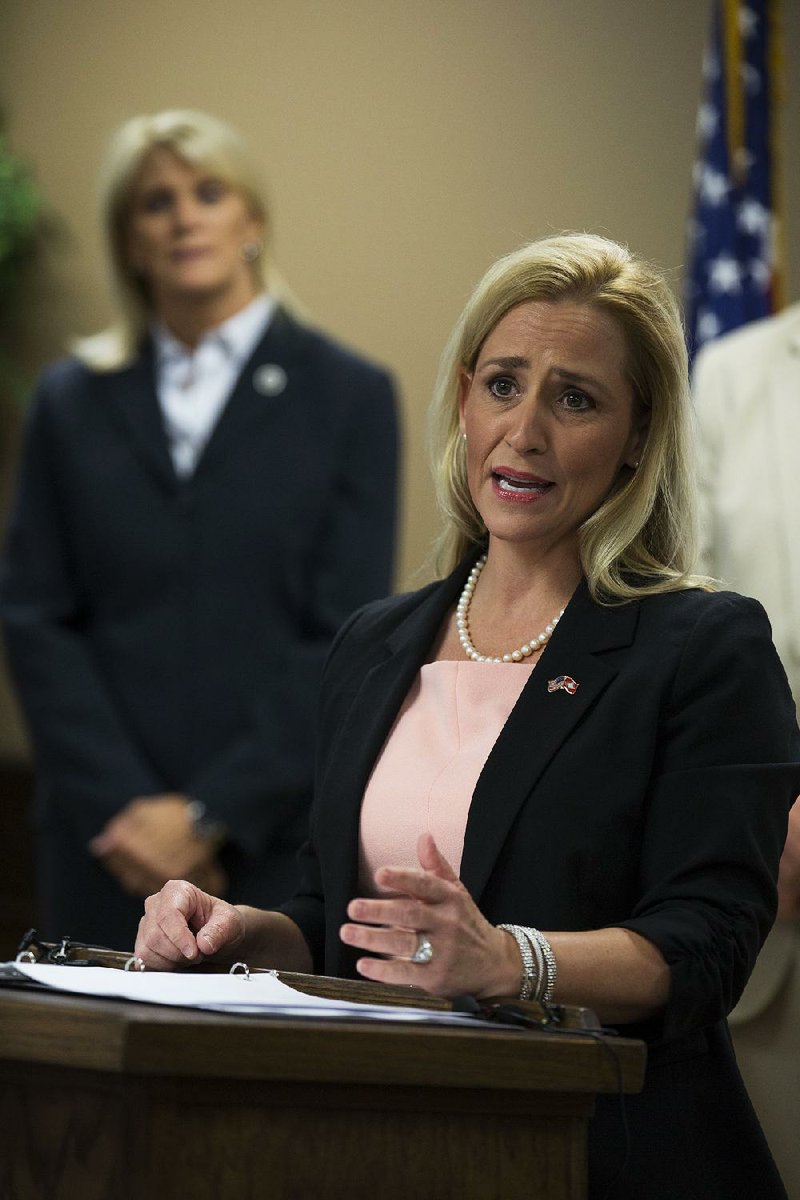Like many agencies, the University of Arkansas' Division of Agriculture Research & Extension asked for more state general revenue funds for the next fiscal year than it was scheduled to receive, but the answer was no.
Now help has arrived from Attorney General Leslie Rutledge, who designated $2.5 million of her office's lawsuit settlement funds for the division.
Over the past 2½ years, the Republican attorney general has distributed her office's lawsuit settlement funds, beyond those spent on office expenses, to an array of state programs, ranging from $2 million to the state Department of Career Education for education and training grants; to $1 million to the University of Arkansas at Little Rock William H. Bowen School of Law for its Business Innovation Legal Clinic; to $850,000 to the state Department of Education for panic buttons in public schools.
Rutledge said she decided to allot the money to the Agriculture Division because she saw a need and because the division's programs reach statewide. Officials had unsuccessfully sought a $3 million increase in the division's general revenue budget of $62.8 million for fiscal 2018, which starts July 1.
According to its website, the division's primary mission is helping producers and processors of food, fiber and fuels access and use appropriate technologies. But the division -- which includes the Cooperative Extension Service -- also helps other people by addressing food-safety and security, health and nutrition, and natural resource conservation. It also offers 4-H and other programs that serve youths, families and communities.
The division has received one-time financial help previously. In July 2015, Gov. Asa Hutchinson and the Legislative Council authorized giving the division $3 million in rainy-day funds, a type of reserve fund.
House Speaker Jerry Gillam, a berry farmer who is a Republican from Judsonia, made increased funding for the division a top priority in advance of the 2015 and 2017 regular legislative sessions. But the general revenue budget for the division remained the same.
Last week, Rutledge's office notified lawmakers about the money her office had designated for the Agriculture Division in a report for the quarter that ended March 31. The report, required by Act 763 of 2013, went to the Performance Evaluation and Expenditure Review Subcommittee and then the Legislative Council.
The $2.5 million comes from an accumulation of settlement proceeds not designated for specific uses in those settlements, said Rutledge spokesman Judd Deere.
"UA received the first disbursement on May 5, 2017. I do not have a specific timetable to offer on when the remaining $2 million will be disbursed," he said.
Under Act 763 of 2013, the attorney general's office is required to report quarterly to the Legislative Council or the Joint Budget Committee on all cash funds received from court orders or settlement agreements. The report includes the case names, the amounts of funds received by the office and a plan for disbursing the funds.
The law also limits the office's Consumer Education and Enforcement Account to a $1 million balance and specifies how the funds in the account are to be used, ranging from expert witness fees to consumer education to court filing fees.
The 2013 law -- sponsored by then-Rep. Andrea Lea, R-Russellville, who is now the state auditor -- was enacted after then-Attorney General Dustin McDaniel, a Democrat, drew criticism for giving to charitable or public interest groups money that his office obtained through litigation on behalf of the state.
McDaniel -- who aborted a bid for governor in January 2013 -- was criticized in some quarters for a long-standing practice, in which the state's attorneys general decided where the money would go without any oversight from lawmakers. Judges often include where money should go in settlement orders, but the orders sometimes are written by the attorney general's office for the judges to sign.
The 2013 law is similar to a policy adopted by McDaniel in September 2011, in the aftermath of the criticism. Under McDaniel's revised policy, money from lawsuit settlements was first distributed to consumers and state agencies as designated by the court or in the settlement agreement.
When there was no individual or agency specified to receive restitution, a second option was for the money to be allocated to a state agency related to the case in some way, to pay attorneys' fees or to go into the state treasury. A third option was that up to $1 million would stay in the Consumer Education and Enforcement Account of the attorney general for use at the discretion of the attorney general, a McDaniel spokesman said at the time.
Rutledge said she notified legislative leaders during this year's regular session about her plan to designate $2.5 million in settlement funds to the Division of Agriculture. The legislative session recessed April 3 and adjourned May 1.
"This was my idea," she said in a recent interview.
"I saw that there was a need so I reached out to them. They had been asking for money from the Legislature, but I saw there was a need and I said, 'I want to go plug [$2.5 million] in here,'" Rutledge said.
"I wanted to make sure that not only were they able to continue providing the good services that they provide to all 75 counties, because there are extension agents in all 75 counties, but we were able to take what they already have and build on it to reach more people," she said.
Rutledge said she intends for the Division of Agriculture to help educate more Arkansans about "issues we cover in the attorney general's office," including preventing youth dating violence and domestic abuse through the Break the Cycle program, as well as combating identity theft, metal theft, opioid abuse, scams against senior citizens and other problems.
Division of Agriculture officials "plan to invest the money not only in the extension programs that conduct the educational outreach, but also the Division of Agriculture research programs that provide the science-based backbone to our curricula," said division spokesman Mary Hightower.
"The funding will allow us to continue and give more strength to programs we already offer," she said.
"The Division of Agriculture has more than a century of consumer education experience, with curricula in family life, health, and family and personal finance management," Hightower said. "These strengths line up nicely with the attorney general's Break the Cycle program, and her efforts to target prescription drug abuse, senior scams, ID theft and Internet safety. We're still working out the details between our faculty and the attorney general's staff, but are looking forward to launching this initiative."
Senate President Pro Tempore Jonathan Dismang, R-Searcy, said he learned about Rutledge's plans late in the legislative session during his discussions with Gillam and Hutchinson about the state's fiscal 2018 general revenue budget.
"The request from the UA Division of Agriculture was dropped based on the attorney general making that transfer," he said.
Gillam said he understood there was no route to getting more general revenue or rainy-day funds for the Division of Agriculture in the coming fiscal year "given the budget shortfall," amid lagging tax collections.
He said Rutledge's plan "was a great idea."
Hutchinson said, "There are always multiple requests for additional funding that we simply cannot fulfill, and I appreciate the willingness of the attorney general to provide additional funding to the Division of Agriculture."
Hightower said not securing additional general revenue funds for the division "was disappointing to us and our supporters.
"But having Attorney General Rutledge wanting to work with the Division of Agriculture truly is a bright spot for us this spring," she said. "The Division of Agriculture is very grateful for her support of our efforts, and the funding her office is providing will be a big help. It's not a cure-all, but it will go a long way to keep our work going."
A few weeks ago, Hutchinson announced a $70 million cut in the general revenue budget of $5.33 billion for fiscal 2017, which ends June 30. He cited lagging sales and corporate income tax collections. He also announced a $43 million reduction in the $5.49 billion general revenue budget for fiscal 2018.
The $733.5 million general revenue budgets for public colleges and universities, including the UA Division of Agriculture, won't be affected by the cuts.
The Division of Agriculture's general revenue funding has been at nearly $63 million since fiscal 2011. It totaled $60.6 million in fiscal 2010, according to the state Department of Higher Education.
Rutledge, who was elected in 2014 and is seeking re-election in 2018 to her second four-year term, said she isn't using the granting of the lawsuit settlement dollars to pave the way for a future run for governor.
"What I look at, does it have statewide impact, the demographics it touches, and that's why giving money to the Extension Service is important," she said.
That's also why she said she has given, among other things, $14.4 million in lawsuit settlement dollars to the state treasury in 2015 to help offset prison costs, $2.5 million to the Crime Victims Reparations Program after its funds were depleted, and $500,000 to the then-Department of Rural Services for volunteer fire departments.
Last year, Rutledge also gave $1 million in settlement funds to the UALR's Bowen law school to create the Business Innovation Clinic. She is a graduate of the UALR law school.
Asked how the clinic serves a statewide need, Deere said, "Small businesses are the backbone of our economy, and this clinic will allow students at Bowen the opportunity to learn how to do the legal work for entrepreneurs while at the same time directly help businesses to grow and create more, better-paying jobs for Arkansans while protecting consumers."
State agencies are required to have enough of an appropriation or spending authority in cash funds to spend lawsuit settlement funds distributed by the attorney general's office, said Kevin Anderson, assistant director of the Bureau of Legislative Research.
Asked why lawsuit settlement funds aren't appropriated by the Legislature through the General Improvement Fund each year, Deere said, "Settlement dollars are not a guarantee, so it is impossible and impractical to make them part of an appropriated budget."
The General Improvement Fund consists largely of surplus general revenue.
Act 763 of 2013 gives the attorney general the authority to direct the use of the funds, Deere said.
"Since taking office, Attorney General Rutledge has routinely worked with the governor and members of the General Assembly to determine needs in many cases. [Ensuring] that the impact of the funds distributed and used has a statewide or regional reach set up through a government entity has been an important part of the decision-making process."
Asked whether the Legislature and governor should appropriate the lawsuit settlement funds, Hutchinson said, "It's something we should continue to monitor.
"But the attorney general has proven to be a great partner on special needs of the state in many areas, especially law enforcement," he said.
SundayMonday on 05/21/2017



